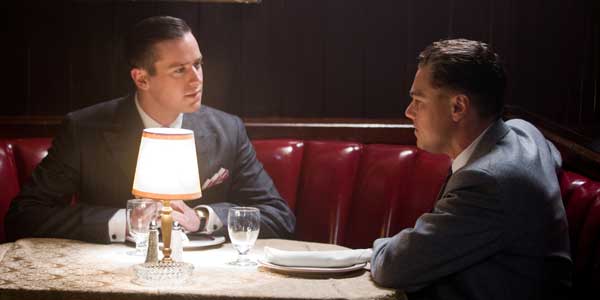
Director: Clint Eastwood
Running Time: 130 mins
Certificate: 15
Release Date: June 11th, 2012

J. Edgar is a movie that’s perhaps better off on DVD and Blu-ray than it was in cinemas. The reason for that is that it’s a rather narratively complex beast and so takes at least a couple of viewing to properly unravel. Its problem is that the first viewing is likely to seem rather dull to many, so they’re less likely to want to revisit it.
Leonardo DiCaprio plays J. Edgar Hoover, who for nearly half a century oversaw the FBI from when it was a fledgling organisation, though the depression and era of the gangster, onto the red scare and beyond. The film sees Hoover as an old man dictating his memoirs, while in flashback we see his earlier days and how he quickly climbed to the top of the Bureau Of Investigation (as it was initially known) and used the likes of the Lindbergh Baby kidnapping to increase the power of the organisation.
However as the years go by he becomes increasingly power-hungry and intolerant of detractors, using secret information and smear campaigns against his opponents and those he personally decided were the enemies of the US. This turns the FBI into his personal fiefdom, with Hoover unafraid to essentially blackmail successive Presidents in order to ensure he keeps control of his organisation.
Through nearly all this, two people stay by Hoover’s side, his trusted secretary, Helen Gandy (Naomi Watts), and the man who become his confidante and second-in-command, Clyde Tolson (Armie Hammer).
The historical Hoover is an insanely complex figure, and it’s virtually impossible to know for sure what’s true about him and what isn’t. His enemies circulated rumours about him and the man himself was more than willing to massage his own biography to make himself look better. He was notoriously private, so who he really was behind the public image is tough to tell. It’s something the film realises and indeed becomes a major theme, with Hoover shown as a man obsessed with his own legacy and not as interested in the truth as the (more positive) story he can sell.
However it’s also where the movie slightly comes unstuck. Screenwriter Dustin Lance Black attempts an incredibly bold and complex gambit, which almost demands multiple viewings to really comprehend what he’s doing. The film mixes known facts about Hoover with a certain amount of speculation about his life, but then adds in the fact that some of what we’re seeing is Hoover’s massaged recollections of events for his memoirs. It means the film is in part the filmmakers’ idea of what happened and some of it is Hoover’s version, with the film acknowledging that neither of those is guaranteed to be reliable.
The problem with this is that it makes the narrative rather complex, jumping between eras and perspectives, and sometimes only revealing that what you’ve seen may not have been 100% true quite a while after you’ve seen it. Black should be applauded for a brave attempt at showing the difficulty of biography, especially of someone like Hoover, but it is problematic.
The main issue is that while J. Edgar seems to want to reveal Hoover as a man and what drove him, by the end it’s still not clear who he was – not in the sense that it leaves him an enigma, but the script seems uncommitted. It’s a brave attempt not to go too far from the historical record, but it’s undoubtedly frustrating. For example, there have been many rumour Hoover was a transvestite. To be honest, this seems to have been made up out of whole cloth by his detractors and has survived over the years due to the salacious idea of a man who was outwardly so keen to be seen as righting the wrong of the world (admittedly in a rather corrupt manner) secretly dressing as a woman. However J. Edgar doesn’t want to absolutely say yes or no to the rumours, instead coyly including a scene that basically says they don’t know if he was a transvestite or not, but if he was, this is why it might have been.
Likewise, there’s Hoover’s relationship with Clyde Tolson. There’s no doubt the two men were absolutely dedicated to one another, spending decades at each other’s side, not just professionally but personally too – they holidayed, dined and went out on the town together. Indeed, after Hoover died, it was Tolson who inherited his estate, received the US flag draped on his coffin and was later buried a few yards from him. This inevitably led to speculation they were in a gay relationship, although there’s never been any indisputable evidence to corroborate this. As a result the film again seems slightly unsure how to present the relationship. While it handles it better than the transvestism, there’s still an element of it trying to cover all bases and say ‘well, if this is what was going on, here’s why’, whether it was a platonic love, repressed homosexuality or something more. There is a very strong scene in a hotel room where it attempts to give some clarity, but it still leaves uncertainty hanging.
Biopics are often criticised for taking license with historical facts, but J. Edgar is a bit of a lesson in why they do that, which is that watching something that sticks close to what can be properly established and where speculation is largely used to show up possible motivations behind the rumours, is a tad unsatisfying. The script undoubtedly deserves kudos for attempting something rather fearless and potentially far more honest than most biopics, but it doesn’t quite manage it.
I wonder whether part of the problem is a mismatch between such a complex script and Clint Eastwood’s relatively straightforward style. Clint’s a wonderful storyteller, but as the likes of Hereafter have shown, he has issues when scripts take complicated turns and try to juggle multiple ideas and storylines at once. He ensures J. Edgar is a wonderful looking movie and draws an utterly superb performance from Leo DiCaprio (who really deserved an Oscar nomination), but he perhaps doesn’t have the directorial bravado and narrative fearlessness that could perhaps have turned Black’s script into something transcendent. I was left with the feeling that the movie’s problems weren’t the direct fault of either the director or the screenwriter, but that perhaps they didn’t work together – but then, few other directors than Eastwood would have left a script like this so open, making it a slightly unfortunate situation.
It means the overall sensation on a first viewing it that they’re telling a fascinating story about an incredible man, and yet making it slightly dull and frustratingly uncertain. There are admirable reasons for this and watching the film a second time reveals a complex and more interesting picture of what the film is trying to do, but as mentioned, how many people will want to watch a movie a second time if they felt it was a bit boring first time around?
It’s a real shame, as what J. Edgar tries to do with its structure is fascinating – almost a meta-narrative on the idea of biography and how we reconstruct our own and other’s live. It’s something I would love to be able to praise unequivocally, as it’s full of hints at something new and potentially brilliant, but it doesn’t quite come together to live up to that promise. There’s still a lot of good stuff in J. Edgar, including some excellent acting, a great period feel, incredible make-up to age the actors and a sweet look at two men’s devotion to one another (even it can’t 100% commit to what drove that devotion).
But who was Hoover? At the end of the film it’s difficult to tell, and in some respects – such as how he ended up so happily disregarding the law, when he’d spent decades as the face of crime-fighting – seem even murkier than they did when the film opened. Hoover was a complex person and so much of what’s said about him is contradictory, and the film reflects that, but as a movie it makes it somewhat unsatisfying.
The DVD includes a single featurette looking at the making of the movie and what they were trying to achieve. Everyone seems aware that they’re playing a somewhat high stakes game with a complex script about a subject it’s difficult to dissect. It’s just a shame the film, while not a complete loss, doesn’t quite match its lofty ambitions.
Overall Verdict: A brave, narratively complex movie about a fascinating subject, but it’s attempts to almost reconcieve the biopic don’t quite work, leaving an intriguing but slightly dull experience.
Reviewer: Tim Isaac





Leave a Reply (if comment does not appear immediately, it may have been held for moderation)